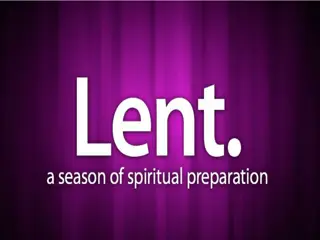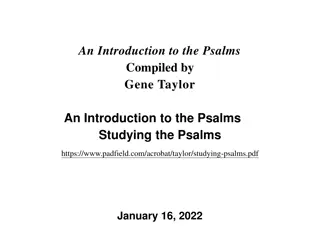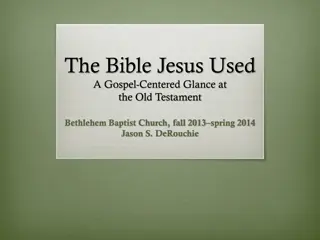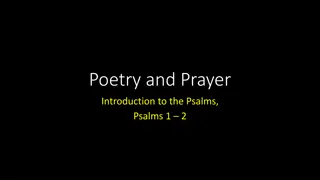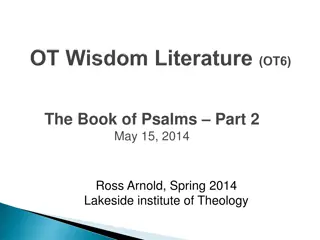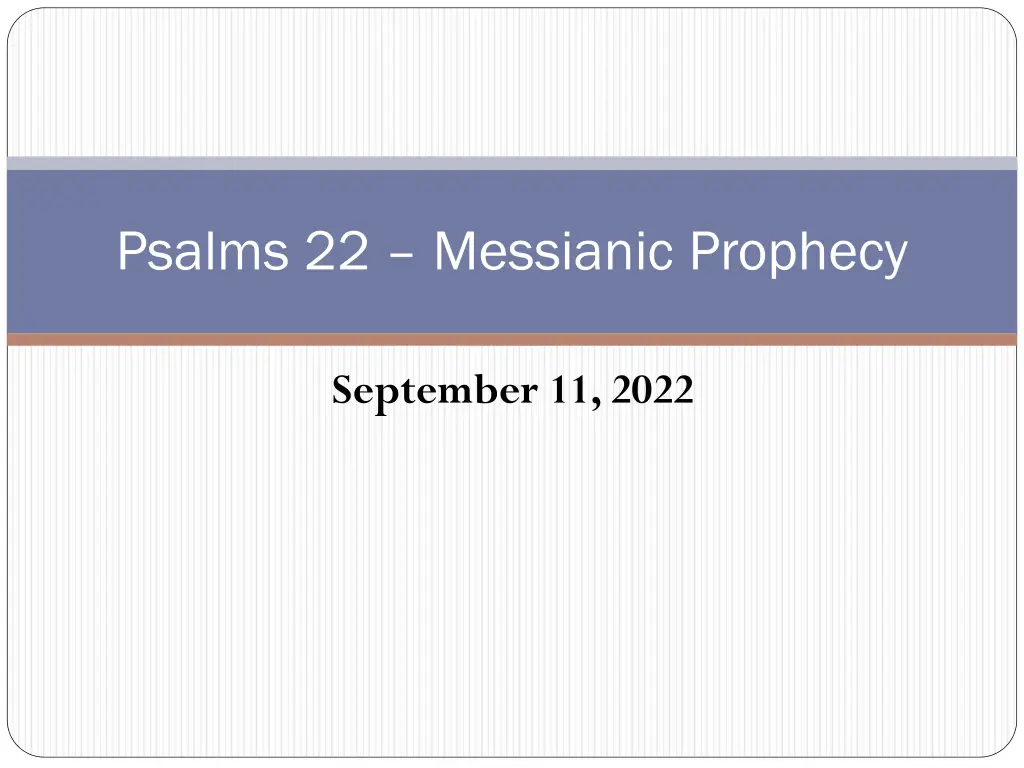
Messianic Prophecy in Psalms 22
Explore the Messianic Prophecy in Psalms 22, examining whether it refers to Christ or David, with insights on Jesus' suffering, forsakenness, and redemption. Delve into the significance of Psalms 22 in relation to the New Testament and the events of the crucifixion.
Download Presentation

Please find below an Image/Link to download the presentation.
The content on the website is provided AS IS for your information and personal use only. It may not be sold, licensed, or shared on other websites without obtaining consent from the author. If you encounter any issues during the download, it is possible that the publisher has removed the file from their server.
You are allowed to download the files provided on this website for personal or commercial use, subject to the condition that they are used lawfully. All files are the property of their respective owners.
The content on the website is provided AS IS for your information and personal use only. It may not be sold, licensed, or shared on other websites without obtaining consent from the author.
E N D
Presentation Transcript
Psalms 22 Messianic Prophecy September 11, 2022
Introduction: Introduction: Does this psalm refer to the Christ or not? Hebrews 2:12 quotes Psalms 22:22 and applies it to the sufferings of Christ. Note how many points are indirectly quoted or referred to in the New Testament when Jesus is in the midst of His suffering in arrest, trial, and crucifixion. Does Psalms 22 refer at all to David himself or strictly to the coming Messiah? David is called a prophet by Peter (Acts 2:30) and may not be speaking about himself at all, but only prophesying of the Messiah to come. Note: None of the information we read in this psalm can be found historically as events in David s life. But these events can be found in the suffering of the Christ. Note: Contrast between what appears and what is known.
Suffering, Yet Calling For Deliverance Suffering, Yet Calling For Deliverance Jesus quoted Psalms 22:1-2 in Matthew 27:46; Mark 15:34. Was Jesus literally forsaken? (cf. Isaiah 54:7-10). Forsake: transitive verb; to renounce or turn away from entirely. (Webster) `azab (aw-zab'); a primitive root; to loosen, i.e. relinquish, permit, etc. (New Exhaustive Strong s Numbers and Concordance with Expanded Greek-Hebrew Dictionary.) He may leave us without help for a small moment, but in his good pleasure, help will ultimately come. The help that the Son sought did indeed come to him (verses 21, 24). (Evan and Marie Blackmore, Psalms I, Truth Commentaries, page 280)
Suffering, Yet Calling For Deliverance Suffering, Yet Calling For Deliverance Jesus quoted Psalms 22:1-2 in Matthew 27:46; Mark 15:34. Was Jesus literally forsaken? 1. The consequence of the position is not very attractive. Jesus came to do the will of the Father, which involved His suffering and death on the cross (Hebrews 10:5-10). Jesus carried out the Father s will with absolute perfection. John 8:29, And he that sent me is with me; he hath not left me alone; for I do always the things that are pleasing to him. Did God forsake one who was always pleasing the Father? John 16:32, Behold, the hour cometh, yea, is come, that ye shall be scattered, every man to his own, and shall leave me alone: and (yet) I am not alone, because the Father is with me.
Suffering, Yet Calling For Deliverance Suffering, Yet Calling For Deliverance Jesus quoted Psalms 22:1-2 in Matthew 27:46; Mark 15:34. Was Jesus literally forsaken? 2. Paying the price for our sins did not necessitate spiritual separation of the Father and the Son. He was simply paying a price of redemption (Matthew 20:28; 1 Timothy 2:6), spiritual separation was not necessary. No individual s sins can separate any other person from God (Ezekiel 18:4-32). Jesus did not endure: a. Temporary separation. We ve already suffered that. If this is the sacrifice made by Jesus, then we have already paid the price. b. Eternal separation. Jesus is in heaven (Colossians 3:1). But if He died separated from the Father, how could He have gone to Paradise (Luke 23:43)?
Suffering, Yet Calling For Deliverance Suffering, Yet Calling For Deliverance Jesus quoted Psalms 22:1-2 in Matthew 27:46; Mark 15:34. Was Jesus literally forsaken? The price paid by Jesus, was the blood shed by Jesus as a sin- offering. Jesus is the lamb slain before the foundation of the world (Revelation 13:8). It is with His precious blood that we are redeemed (1 Peter 1:18-19). It is through the shedding of that blood that we are forgiven (Ephesians 1:7). This is how Jesus was made to be sin (2 Corinthians 5:21), and that He became a curse (Galatians 3:13) for us.
Suffering, Yet Calling For Deliverance Suffering, Yet Calling For Deliverance Jesus quoted Psalms 22:1-2 in Matthew 27:46; Mark 15:34. Was Jesus literally forsaken? The price paid by Jesus, was the blood shed by Jesus as a sin-offering. He was not literally sin, but He was made a sin-offering. Jesus did not become guilty of the sins any more than the animals involved in the Old Testament sacrifices became literally guilty. The shedding of the blood became the means of forgiveness and the way by which the wrath of God was appeased. In contrast to the animals, Jesus came to do the will of God. Hebrews 10:10, By which will we have been sanctified through the offering of the body of Jesus Christ once for all.
Suffering, Yet Calling For Deliverance Suffering, Yet Calling For Deliverance What is meant by the phrase: My God, My God, why have You forsaken Me? (NASV) By quoting the first line of Psalms 22, Jesus was appropriating the message of the psalm to Himself. The psalm can be broken down into two major parts: 1. Forsaken by God (verses 1-21) 2. Delivered by God (verses 22-31) The psalm begins with this desperate phrase quoted by Jesus, but as it proceeds it expresses a victorious assurance of deliverance!
Suffering, Yet Calling For Deliverance Suffering, Yet Calling For Deliverance What is meant by the phrase: My God, My God, why have you forsaken Me? (NASV) Note: We should not see these words of Jesus in a vacuum (without context), for other parts of the psalm fit with the events of the cross; other prophecies are fulfilled (e.g., verses 7-8, 16-18).
Suffering, Yet Calling For Deliverance Suffering, Yet Calling For Deliverance What is meant by the phrase: My God, My God, why have You forsaken Me? (NASV) Verses 7-8 express exactly what happened with those who mocked and sneered at Jesus. They did not think that God would deliver Jesus because He appeared so despised and smitten by God. It was the people who esteemed Jesus to be smitten and afflicted by God (Isaiah 53:4).
Suffering, Yet Calling For Deliverance Suffering, Yet Calling For Deliverance What is meant by the phrase: My God, My God, why have You forsaken Me? (NASV) The psalm shows that, in reality, the one uttering the cry has been heard. Verse 22 marks a change from defeat to victory. Note verse 24: For he hath not despised nor abhorred the affliction of the afflicted; neither hath he hid his face from him; but when he cried unto him, he heard.
Suffering, Yet Calling For Deliverance Suffering, Yet Calling For Deliverance What is meant by the phrase: My God, My God, why have You forsaken Me? (NASV) If the hearers knew the psalm from which Jesus quoted, they would know the victory expressed in the latter part it. In dying on the cross, Jesus carried out this work. He finished the work that God had promised and foretold so long before. John 19:30, When Jesus therefore had received the vinegar, he said, It is finished: and he bowed his head, and gave up his spirit. cf. Psalms 22:25-31 God carried out justice and finished the work of providing for salvation for all of mankind.
Suffering, Yet Calling For Deliverance Suffering, Yet Calling For Deliverance What is meant by the phrase: My God, My God, why have You forsaken Me? (NASV) Jesus was referring to Psalms 22 as the fulfillment of the prophecy. It points to the victorious nature of God s deliverance in the midst of a time that appeared so dismal. Jesus as He quoted this psalm was simply awaiting the deliverance that He knew the Father would provide.
Suffering, Yet Calling For Deliverance Suffering, Yet Calling For Deliverance What is meant by the phrase: My God, My God, why have You forsaken Me? Jesus was not asking for an answer. If we take it to literally mean that God forsook Jesus, then we would also have to take it to mean that Jesus didn t know why. He was referring to Psalms 22 as the fulfillment of the prophecy. It points to the victorious nature of God s deliverance in the midst of a time that appeared so miserable. He was simply awaiting the deliverance that He knew the Father would provide.
Feeling forsaken, yet still trusting (22:1 Feeling forsaken, yet still trusting (22:1- -5) 5) Verses 3-5 offer the contrast to this feeling of being forsaken. Here we see a total dependence on God to deliver. There are two reasons for this hope. God is holy. God is separate from others and is worthy of trust due to His holiness. God is not one who acts like common man and breaks promises. God is holy and righteous and worthy of our trust. God has delivered in the past. The fathers put their trust in God and God delivered them. The proof of this point can easily been seen in the book of Judges. The Son of God knew that deliverance would come to Him, just as the Father had delivered in the past.
Enduring suffering, yet you are Enduring suffering, yet you are always my God (22:6 always my God (22:6- -11) Now the suffering and mockery is described. The treatment of Jesus was like that of a despicable worm. There was no human decency afforded to Him. 11) Verses 7-8 are clearly fulfilled in Matthew 27:39-44. The people around him have despised him (Isaiah 53:3); they treat him as a reproach (Psalms 69:9; Romans 15:3); as something less than a man, a mere worm. He was estranged even from his close relatives (Psalms 69:8; cf. John 7:3-5).
Crucified, yet still looking for Crucified, yet still looking for deliverance (22:12 deliverance (22:12- -21) The enemies have surrounded Him and the lions have their mouths open ready to devour their prey. Verse 11 All His human supporters have deserted him; only the Father has remained with Him (John 16:32). Verses 14-15 His sufferings affected every part of His being: all His bones, His heart and His bowels, His strength, His tongue and His jaws (cf. Psalms 38:7-11; Psalms 69:3, 21; John 19:28-29). Verse 16 He is surrounded by enemies. His enemies are many, and they have power over Him (cf. John 19:10-11) like the most powerful (strong) animals: bulls (proverbial for their strength, Proverbs 14:4) and the lion ( strongest among beasts, Proverbs 30:30). 21)
Crucified, yet still looking for Crucified, yet still looking for deliverance (22:12 deliverance (22:12- -21) 21) Notice the last line of verse 15, and thou hast brought me into the dust of death. This verse shows the imminent reality of death. Verse 16 Describes our Lord s crucifixion they pierced my hands and my feet. (John 20:25; Luke 24:39-40) Verse 17 The people surrounding Him look and stare, but they either mock or do nothing at all (Luke 23:35; Matthew 27:36, 39). Verse 18 They divide His garments among themselves, and cast lots to see who will have His clothing (vesture), as described in Mark 15:24; John 19:23-24.









